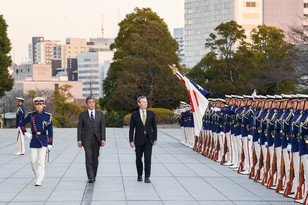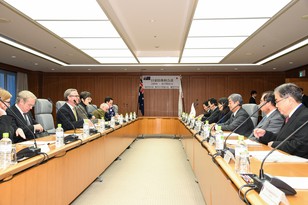 SPECIAL FEATURE
SPECIAL FEATURE
5th Japan-France Foreign and Defense Ministerial Meeting & Japan-France Defense Ministerial Meeting
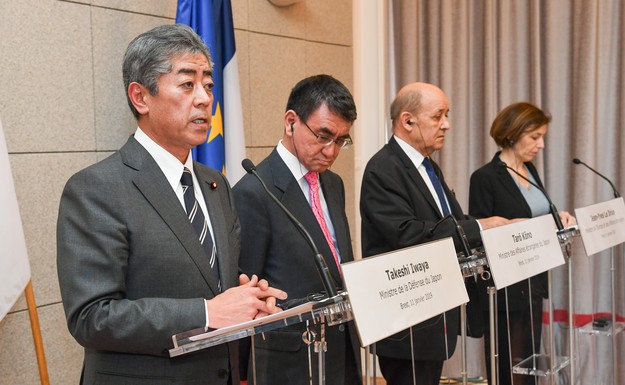
On January 11th, Minister of Defense Iwaya and Minister for Foreign Affairs Kono met with H.E. Ms. Parly, Minister for the Armed Forces of the French Republic and H.E. Mr. Le Drian, Minister for Europe and Foreign Affairs of the French Republic as part of the 5th Japan-France Foreign and Defense Ministerial Meeting (“2+2”) while visiting Brest, France.
1 Overview
- The four Ministers shared the view that Japan and France, which share fundamental values and strategic interests as Special Partners and holders of the Presidency of the G20 and G7 respectively this year, would cooperate closely for the peace and stability of the international community.
- The Ministers shared the view that Japan and France, as both maritime and Pacific nations, would promote concrete cooperation to maintain and strengthen a free and open Indo-Pacific. On this point, to realize cooperation in the maritime field in particular, the four Ministers decided to launch the Japan-France Comprehensive Maritime Dialogue.
- The Ministers welcomed the announcement of Japan’s National Defense Program Guideline (NDPG) and Mid-Term Defense Program (MTDP) as well as France’s Strategic Review and Military Programming Act 2019-2025.
2 Japan-France Security and Defense Cooperation
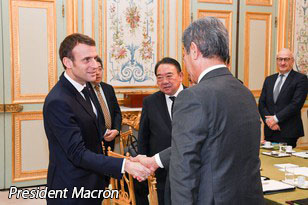
The Ministers shared the view that Japan and France would further cooperate on maritime security including Maritime Domain Awareness (MDA) and in areas such as capacity building assistance in Southeast Asian and Pacific Island states while realizing synergies in both countries’ efforts in the Indo-Pacific region.
3 Regional Situation
- The Ministers reaffirmed the necessity of the complete implementation of United Nations Security Council (UNSC) resolutions and the realization of the complete, verifiable and irreversible disposal by North Korea of all of its weapons of mass destruction and ballistic missiles of all ranges. Minister Iwaya and Foreign Minister Kono appraised France’s decision to dispatch a naval vessel and aircraft in the first half of this year to monitor illegal maritime activities including illegal ship-to-ship transfers. The four Ministers also reaffirmed that Japan and France would continue to collaborate closely for the complete implementation of UNSC resolutions.
- The Ministers affirmed the importance of a free and open maritime order based on the rule of law, and stated that they would strongly oppose any unilateral actions that increase tensions.
- The Ministers also exchanged views on matters such as disarmament and non-proliferation, and the situations in Syria and Russia.
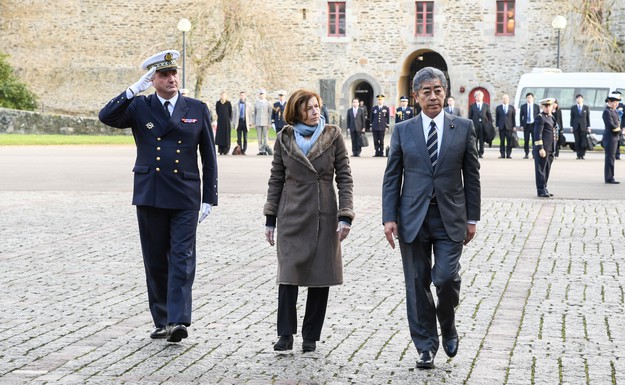
Japan-France Defense Ministerial Meeting
On January 11th, Minister Iwaya met with Minister Parly in Brest for the Japan-France Defense Ministerial Meeting.
1 Introduction
Minister Parly conveyed her congratulations for Minister Iwaya’s appointment and words of welcome for holding their first Japan-France Defense Ministerial Meeting. Both Ministers confirmed the achievements of defense cooperation last year, on the 160th anniversary of the establishment of diplomatic relations between Japan and France, and shared the view that Japan and France would cooperate further as "Special Partners."
2 Defense Policy of both Countries
- Minister Iwaya explained Japan’s National Defense Program Guidelines formulated late last year and how Japan envisages to progress closer cooperation with France in line with that policy.
- Minister Parly stated that France shares a continued commitment to the stability of the Indo-Pacific region. Both Ministers confirmed that there are many points in common in their policies on the region.
3 Japan-France Defense Cooperation
- Both Ministers welcomed the progress on cooperation between the countries’ maritime forces over the last year and reaffirmed that Japan and France would implement joint trainings, seizing the opportunity of the French aircraft carrier Charles de Gaulle’s department to the Indian Ocean this year. Furthermore, both Ministers agreed to examine more practical and regular joint trainings across all service branches. Minister Iwaya welcomed the signing of the Japan-France Acquisition and Cross-Servicing Agreement (ACSA) in July 2018.
- Furthermore, they welcomed the commencement of joint research related to next generation mine detection this June, which represents the first cooperation project between Japan and France in the area of defense equipment and technology cooperation.
4 North Korea
Minister Parly explained France’s plan to dispatch naval vessels and aircraft in the first half of this year as a countermeasure against illegal ship-to-ship transfers by North Korea. Minister Iwaya welcomed this statement.
5 Conclusion
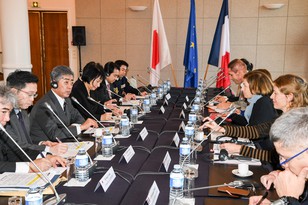
The Ministers welcomed the productive discussions between the defense authorities before the Japan-France “2+2” meeting and reaffirmed continuing close collaboration for the deepening of defense cooperation.
Minister Iwaya’s visit to the U.S.
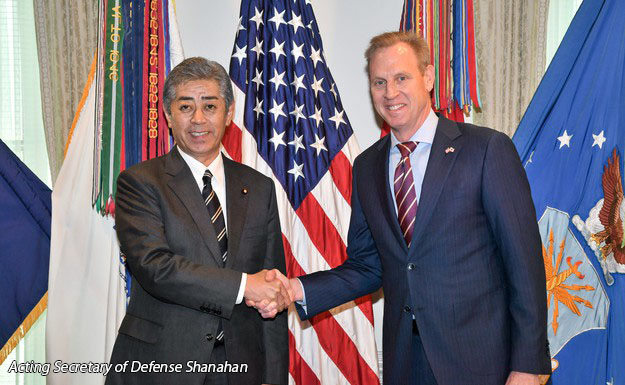
From January 15th to 19th, Minister Iwaya visited the U.S. On January 16th, Minister Iwaya and Acting Secretary of Defense Shanahan held a meeting at the U.S. Department of Defense.
1 Japan-U.S. Defense Cooperation
Both sides exchanged opinions based on the new NDPG and MTDP formulated last December. Acting Secretary Shanahan supported NDPG and MTDP, and welcomed that Japan expressed its strong resolve to enhance its defense architecture and to play a larger role.
In regards to the current security environment, both sides shared views that competition among states is becoming more apparent. They also agreed that gaining technological superiority in new domains such as space, cyberspace and electromagnetic spectrum is increasingly important.
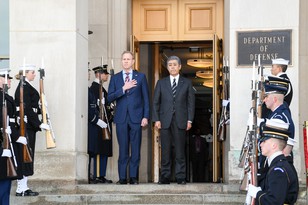
Both sides also confirmed that they will closely coordinate in their efforts to be made pursuant to Japan’s NDPG and MTDP, and the U.S.’s National Defense Strategy (NDS) respectively, as well as to even strengthen the alliance capability to deter and respond following the Guidelines for Japan-U.S. Defense Cooperation. With the vision of Free and Open Indo-Pacific in mind, they agreed to work together to shape a desirable security environment with Japan-U.S. alliance being the cornerstone of cooperation with other nations. Furthermore, both sides confirmed to strengthen and expand cooperation in wide range of fields including the following:
- Promote Japan-U.S. cooperation in the “new domains,” including space, cyberspace and electromagnetic spectrum. The U.S. welcomed Japan’s first participation in the Schriever Wargame.
- Closely coordinate in joint exercises and capacity building assistance, taking into account increasing both nations’ presence in the Indo-Pacific.
- Welcome and even make progress in the two countries’ cooperation in the operational field following Japan’s Legislation for Peace and Security and the Guidelines (e.g. U.S. Forces asset protection mission conducted by the Japan Self-Defense Forces (JSDF), provision of supplies and services)
- Make continued effort in streamlining FMS process, while welcoming the recent progress and improvements in issues related to FMS. Cooperate in ensuring cost transparency, improving late case closure, strengthening activities to realize and promote multi-year procurement.
- Continue cooperation to realize Japan’s smooth and prompt introduction, as well as cost management of U.S.-made advanced defense equipment such as Aegis Ashore, E-2D and F-35.
- Enhance cooperation in defense equipment and technology as well as promoting Japan-U.S. joint development and researches.
2 Regional Affairs
Both sides exchanged opinions on the recent developments on issues on North Korea, and confirmed they continue to support full implementation of the UNSC resolutions for a complete, verifiable and irreversible dismantlement of all North Korea’s weapons of mass destruction (WMD) and ballistic missiles of all ranges. Both sides agreed that Japan and the U.S. will continue working together with partner countries to counter North Korea’s illicit “ship-to-ship” transfers of refined petroleum products and other materials. Furthermore, both sides confirmed that deterrence through Japan-U.S. Alliance and U.S.-ROK Alliance is essential in maintaining the security of the region, and agreed that both countries will steadily implement Japan-U.S. bilateral exercises.
In regards to the East and South China Seas, both sides affirmed their position that they oppose unilateral attempts to change the status-quo by coercion, and that it is important to work together to make sure that Rule of Law and Freedom of Navigation are firmly established. Both sides also reaffirmed that Article 5 of the Japan-U.S. Security Treaty applies to the Senkaku Islands, and that they would oppose any unilateral actions which attempt to undermine Japan’s administration of the islands. Both sides confirmed that Japan and the U.S. work together for the peace and stability of the East China Sea.
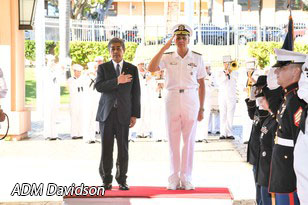
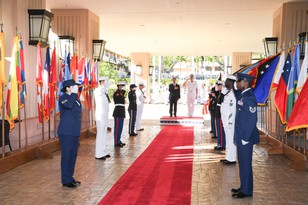
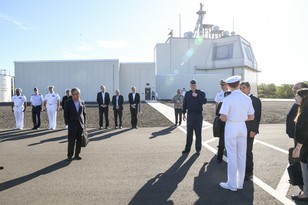
3 The U.S. Forces in Japan
Both sides affirmed the recent progress in the construction project of Futenma Replacement Facility, and reconfirmed that the relocation to Henoko-saki is the only solution to avoid the continued use of the Futenma Air Station. Minister Iwaya requested for cooperation in the Government of Japan’s efforts to mitigate impact on the local communities including Okinawa. Both sides confirmed to work closely together for the steady implementation of the U.S. forces realignment initiatives and training relocation. Both sides also affirmed the importance to ensure the safe operations of the U.S. Forces.
Also, on January 15th, Minister Iwaya exchanged views with Dr. Mahnken, President of the Center for Strategic and Budgetary Assessments (CSBA).
On January 16th, Minister Iwaya delivered remarks at the Center for Strategic and International Studies (CSIS) and had a meeting with Dr. Hamre, President of CSIS.
On January 18th, he visited Pacific Missile Range Facility and exchanged views with Admiral Davidson, Commander of the U.S. Indo-Pacific Command.
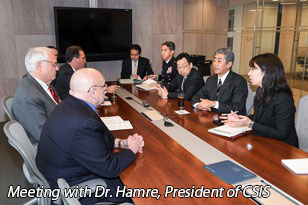
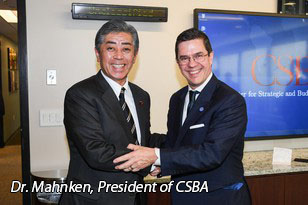
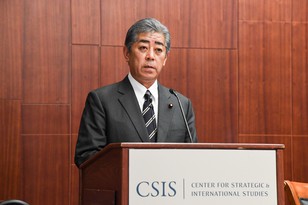
Japan-Australia Defense Ministerial Meeting
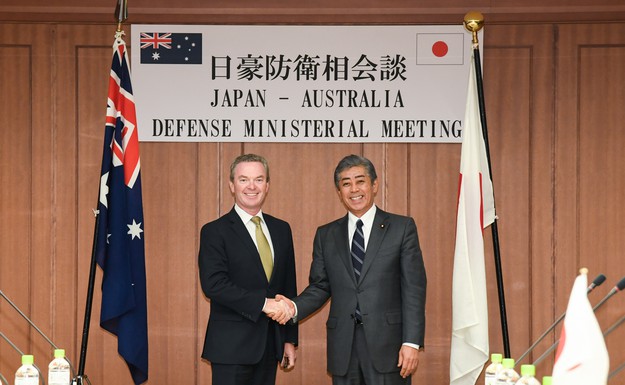
On January 23rd, Minister Iwaya held a Japan-Australia Defense Ministerial Meeting with the Hon. Payne, Minister for Defence, Australia.
1 Overview
Both Ministers welcomed meeting again since the Japan-Australia “2+2” and the 5th ASEAN Defense Ministers’ Meeting-Plus (ADMM-Plus) in October last year and, based on the Japan-Australia Ministerial Meeting in November in the same year where the Prime Ministers “directed their respective Ministers of Defense to further enhance and explore practical and effective defense cooperation,” reaffirmed their strong intention to further expand and deepen defense cooperation between Japan and Australia based on the Special Strategic Partnership between both countries.
2 Regional Situations
Both Ministers shared their recognitions of situations including those related to North Korea, the South China Sea, and the East China Sea, and reaffirmed that Japan and Australia would continue to cooperate closely. Also, in relation to North Korea, Minister Iwaya welcomed Australia dispatching patrol aircraft on three occasions last year in December to counter illegal ship-to-ship transfers.
3 Defense Policy Update
Minister Iwaya explained Japan’s latest defense policies including the NDPG approved in December last year and the MTDP. In response, Minister Pyne welcomed and stated his welcome to, and support for the new NDPG and the MTDP. Minister Pyne explained Australia’s recent policy to enhance engagement in the Pacific.
In addition, both Ministers reaffirmed Japan and Australia would further promote efforts for maintaining and enhancing a free, open Indo-Pacific and collaborate closely through Japan and Australia’s respective defense authorities.
4 Japan-Australia Defense Cooperation
Both Ministers confirmed the status on new initiatives to further strengthen defense cooperation identified on the occasion of the Japan-Australia “2+2” last year. Both Ministers welcomed implementation of a joint mine-clearing exercise (Japan-U.S.-Australia joint exercise), Japan-U.S.-Australia Joint Training “Southern Jackaroo,” and the Japan-Australia joint exercise Bushido Guardian, the smooth progress on staff talks, and schedule readjustments, and reaffirmed that they would deepen ongoing Japan-Australia defense cooperation in concrete and practical forms.
Both Ministers affirmed that their defense authorities would strive to conclude negotiations as early as feasible on the Reciprocal Access Agreement to improve administrative, policy, and legal procedures to facilitate joint operations and exercises between Japan and Australia. Also, both Ministers reaffirmed that they would promote ongoing defense equipment and technology cooperation including promotion of joint research to strengthen both countries’ defense manufacturing and technology bases.
